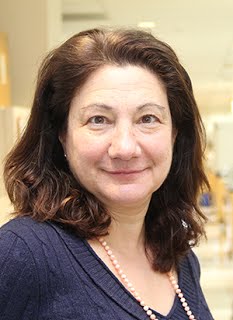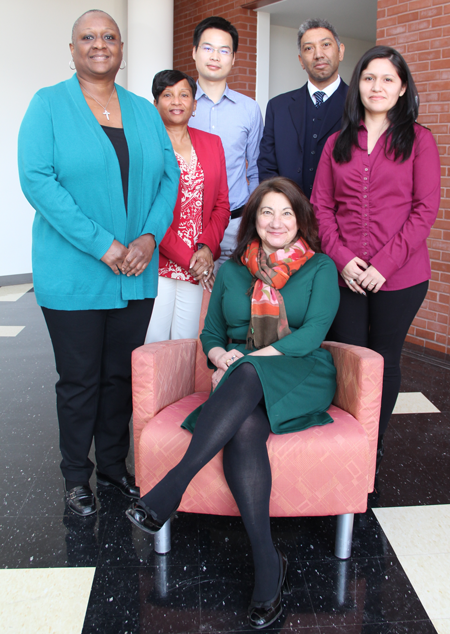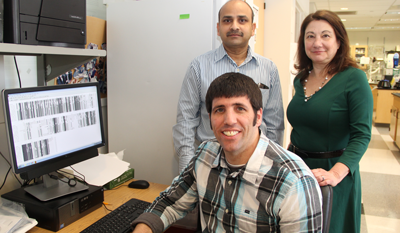March, 2016 - Vivian M. Bellofatto, Ph.D.
Professor and Interim Chair
Microbiology, Biochemistry and Molecular Genetics
International Center for Public Health, Rutgers NJMS

Q: What do you find most satisfying about the work
that you do?
A: At this point, I work tirelessly to help my junior and senior faculty fulfill their scientific goals and continue to make important contributions to discovery science.
I love working to set up new collaborations and then help facilitate their success!

EDUCATION
"I grew up in Upper Montclair, NJ, received my BS from Douglass College/Rutgers University, and completed a senior thesis under the wonderful mentorship of Dr. Evelyn Witkin. After a year working as a Research Technician with Dr. Richard Burgess at the University of Wisconsin, I joined Dr. Lucy Shapiro’s laboratory at Einstein College of Medicine for my PhD work in Molecular Biology and Biochemistry."
Q: Do you have a woman role model?
Who? Why?
A: Dr. Witkin and Dr. Shapiro were my first two and extremely important role models. Both women are very creative, hardworking, well organized and enthusiastic scientists as well as excellent mothers, wives and at that time suburban residing individuals. Thus, early on in my career, during my early college years, I was comfortable in pursuing my love of biology and biochemistry. I was incredibly lucky to work with Dr. Witkin initially as a lab dishwasher and then as a summer and thesis student in her laboratory at Douglass College. It is completely appropriate that she was awarded this year's Lasker Award for her beautiful work on DNA repair and mutagenesis.
RESEARCH
"Understanding the underpinnings of gene expression have been my enduring interest; thus I transitioned from working on the differentiating bacterium, Caulobacter crescentus, in the Shapiro lab, to the differentiating protozoan parasite, Trypanosome brucei. As trypanosome molecular genetics was in its infancy at that time, I was tasked with developing the first transgenic parasites during my post doctoral work in Dr. George Cross’ laboratory of Molecular Parasitology at The Rockefeller University. This work, published in Science magazine, allowed us and others to uncover the underpinning of gene expression regulation in trypanosomes. Our discovery science approach is informing the ongoing search to control trypanosomal infections, which cause debilitating and lethal diseases in humans and domestic animals in many developing areas of our world."
"My laboratory at New Jersey Medical School has uncovered several of the molecular components of specific RNA polymerase II-dependent genes that reside in the cell nucleus and specific protein-mRNA interactions that function in the cell cytoplasm. Our goals are to develop therapies for the amelioration of neglected diseases that include trypanosomes and related parasites, and to discover key pieces of the genetic regulatory networks that underlie biology."

Q: What would you consider to be your greatest accomplishment?
A: My year as an ELAM fellow was very eye opening and validating – I was thrilled to learn and problem solve with 50 other highly driven, nerdy women - just like myself - who appreciate the importance of academic biomedical science in the US.
Q: What are a few resources you would recommend to other women in the field of medicine and science?
A: I found that being a Burroughs Wellcome New Investigator over a decade ago placed me in a mentoring program that was instrumental in my success. Active participation in a scientific or medical society provides the inside science - yet outside your institution - support that is key for professional development.
Q. What advice would you give a woman going into a medical or scientific leadership role for the first time?
A: Make sure that you have a partner who is supportive, has time and willingness to complete many of the ‘normal living’ tasks that are necessary for an organized and calming home environment. If you have children, invest money and time into a nanny or other type of childcare. Your career depends on this in the long run.
TEACHING
"My work on trypanosome parasites led me to develop an interest in infectious diseases as global health problems. Accordingly, I teach a component of the infectious disease program to first year medical students and have a keen interest in all aspects of the bacteriology, virology, parasitology and host-pathogen work that goes on in my department."
Q: What strength or characteristic do
you have that contributes most to your professional success?
A: Resilience and always seeing some positive value in anything and everything you encounter and undertake.
